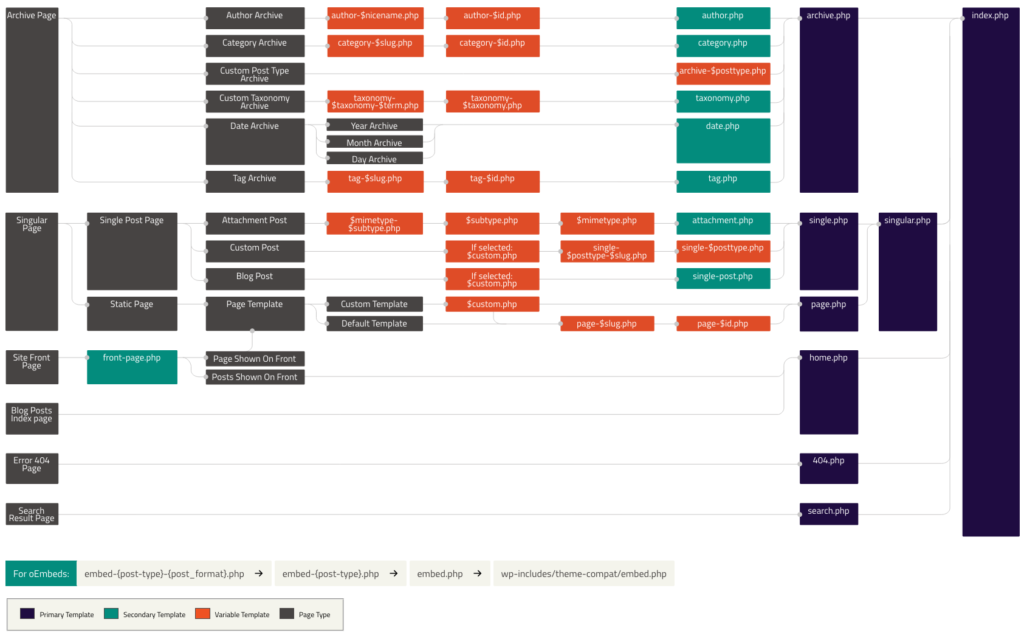如上所述, 模板文件是模块化的、可重用的文件,用于在 WordPress 网站上生成网页。某些模板文件(例如页眉和页脚模板)用于您网站的所有页面,而其他模板文件仅在特定条件下使用。
本文介绍 了 WordPress 如何确定在各个页面上使用的模板文件 。如果要自定义现有的 WordPress 主题,这将帮助您确定需要编辑哪个模板文件。
您还可以使用条件标签来控制在页面上加载的模板。
模板文件层次结构
概述
WordPress 使用查询字符串来决定应该使用哪个模板来显示页面。查询字符串是包含在网站每个部分的链接中的信息。它出现在初始问号之后,可能包含许多由&符号分隔的参数。
简而言之,WordPress 向下搜索模板层次结构,直到找到匹配的模板文件。要确定要使用的模板文件,WordPress:
- 将每个查询字符串与查询类型匹配,来确定用户请求的是哪种类型的页面(例如,搜索页面,类别页面等);
- 按模板层次结构确定使用哪个模板文件来显示这个页面。
- 在当前主题的目录中查找具有特定名称的模板文件,并使用层次结构指定的 第一个匹配模板文件 。
除了基本 index.php模板文件外,您可以自定义使用其他模板文件来显示页面。
如果 WordPress 找不到名称匹配的具体模板文件,它将跳转到层次结构中的下一个文件。如果 WordPress 还是找不到任何匹配的模板文件,最终将使用index.php 模板来显示页面。
示例
举个例子,用户在你的网站上打开了分类目录存档页面:http://example.com/blog/category/your-cat/ ,WordPress 会在当前主题的目录中查找与该类别的 ID 匹配的模板文件,以生成正确的页面。更具体地说,WordPress 遵循以下过程:
- 在当前主题的目录中查找与分类 slug 匹配的模板文件。如果分类 slug 是“unicorns”,则 WordPress 会查找名为的模板文件
category-unicorns.php。 - 如果
category-unicorns.php不存在,并且分类的 ID 为 4,则WordPress 将查找名为的模板文件category-4.php。 - 如果
category-4.php不存在,WordPress 将寻找通用分类模板文件,category.php。 - 如果
category.php不存在,WordPress 将寻找通用存档模板archive.php。 - 如果
archive.php仍然还缺少,WordPress 将会使用主题 index.php 模板。
可视化概述
下图是 WordPress 模板层次结构中,调用模板文件来生成页面的顺序。

层次结构详细信息
虽然通过图表更容易理解,我们还是在下面用文字描述一下各种查询调用模板文件的顺序。
主页显示
默认情况下,WordPress 会在我们的网站首页显示网站的最新文章,这个页面称为文章索引。除此之外,选择一个静态页面作为网站首页。模板文件 home.php 用于显示文章索引,无论您选择最新文章还是静态页面作为首页。如果 home.php 不存在,WordPress 将使用 index.php。
home.phpindex.php
如果
front-page.php存在,它将覆盖home.php模板。
首页显示
front-page.php 模版文件是 WordPress 优先查找的首页模版文件,。该模版优先于 home.php模板。如果该front-page.php文件不存在,WordPress 将使用 home.php或 page.php文件,具体取决于设置→阅读中的设置。如果这两个文件都不存在,最终使用 index.php文件。
front-page.php– 设置→阅读的 首页显示 中设置的“ 您的最新帖子 ”或“ 静态页面 ” 时,优先使用此模版文件 。home.php– 如果 WordPress 找不到 front-page.php,并且在 首页显示 设置了“您的最新文章”,WordPress 将查找 home.php。此外,当在首页显示部分设置文章页面时,WordPress 将查找此文件。page.php– 在 首页显示 部分 设置“ 首页 ”时 。index.php– 首页显示 设置为“ 你最新的文章 ”,但home.php不存在,或者设置了首页,但page.php不存在时,使用此模版文件。
如您上面看到的,WordPress 确定模板的路径有很多,使用上面的图表是确定WordPress 将采用哪个模板文件的最佳方式。
隐私政策页面显示
该privacy-policy.php模板文件是用来显示您网站的隐私政策页面。隐私策略页面模板优先于静态页面(page.php)模板。如果privacy-policy.php文件不存在,WordPress将根据可用模板使用page.php或singular.php文件。如果这些文件都不存在,它将使用该index.php文件。
privacy-policy.php–用于设置→隐私的更改您的隐私政策页面部分中设置的隐私政策页面。custom template file– 分配给页面的页面模板。请参阅get_page_templates()。page-{slug}.php–如果页面slug别名是privacy,WordPress将使用page-privacy.php。page-{id}.php–如果页面ID为6,WordPress将使用page-6.php。page.phpsingular.phpindex.php
单文章页面
单文章模板用来显示某一篇文章。
single-{post-type}-{slug}.php– (从 4.4 开始)首先,WordPress 会查找特定文章的模板。例如,如果 文章类型 是product,并且文章别名是dmc-12,WordPress 会寻找single-product-dmc-12.php。single-{post-type}.php– 如果文章类型是product,WordPress会寻找single-product.php。single.php– 然后 WordPress 回退到single.php。singular.php– 然后又回退到singular.php。index.php– 最后,WordPress 将回退到index.php。
单页
用于呈现静态页面的模板文件( 页面文章类型)。 页面在 WordPress 中是一个特殊的文章类型,使用以下路径来查找模板文件:
自定义模板文件– 在 WordPress 后台选择的 页面模板 。见get_page_templates()page-{slug}.php– 如果页面 slug 是recent-news,WordPress 将使用page-recent-news.php。page-{id}.php– 如果页面 ID 为 6,WordPress 将使用page-6.php。page.phpsingular.phpindex.php
分类目录
WordPress 使用以下层次结构来渲染分类目录页面。
category-{slug}.php– 如果分类目录的别名是news,WordPress 将查找category-news.php。category-{id}.php– 如果类别的 ID 是6,WordPress 将查找category-6.php。category.phparchive.phpindex.php
标签
要显示标签存档页面,WordPress 使用以下路径:
tag-{slug}.php– 如果标签的 slug 是sometag,WordPress 将查找tag-sometag.php。tag-{id}.php– 如果标签的ID是6,WordPress将查找tag-6.php。tag.phparchive.phpindex.php
自定义分类
WordPress 查找自定义分类法模板文件路径的方法稍微不同:
taxonomy-{taxonomy}-{term}.php– 如果分类法是sometax,而分类法项目是someterm,则 WordPress 会查找taxonomy-sometax-someterm.php.在文章格式的情况下 ,分类法是 ‘post_format’,分类法项目是 ‘post-format- {format}。即taxonomy-post_format-post-format-link.php链接格式。taxonomy-{taxonomy}.php– 如果分类法是sometax,WordPress查找taxonomy-sometax.php。taxonomy.phparchive.phpindex.php
自定义文章类型
自定义文章类型使用以下路径来呈现相应的存档页面。
archive-{post_type}.php– 如果文章类型是product,WordPress将寻找archive-product.php。archive.phpindex.php
(要渲染单个文章类型模板,请参阅 上面的单个文章显示部分。)
作者显示
基于以上示例,呈现作者存档页面的层次结构显而易见:
author-{nicename}.php– 如果作者的名字很好matt,WordPress 将寻找author-matt.php。author-{id}.php– 如果作者的 ID 是6,WordPress 将寻找author-6.php。author.phparchive.phpindex.php
日期
基于日期的存档页面按照以下路径查找模版:
date.phparchive.phpindex.php
搜索结果
搜索结果遵循与其他模板类型相同的模式:
search.phpindex.php
404(未找到)
同样,按以下顺序调用 404 模板文件:
404.phpindex.php
附件
呈现附件页面(attachment文章类型)使用以下路径:
{MIME-type}.php-可以是任何 MIME类型(例如:image.php,video.php,pdf.php)。对于text/plain,使用以下路径(按顺序):text-plain.phpplain.phptext.php
attachment.phpsingle-attachment-{slug}.php– 例如,如果附件的 slug是holiday,WordPress 会查找single-attachment-holiday.php。single-attachment.phpsingle.phpsingular.phpindex.php
嵌入功能
嵌入模板文件用于渲染嵌入到其他页面或网站的文章。从 4.5 开始,WordPress 使用以下路径:
embed-{post-type}-{post_format}.php– 首先,WordPress 查找特定文章类型的模板。例如,如果一篇文章的文章类型是post并且格式为音频格式,WordPress 会查准embed-post-audio.php。embed-{post-type}.php– 如果文章类型是product,WordPress 会查找embed-product.php。embed.php– 最后 WordPress 将使用embed.php。- 最后,WordPress 最终回退到内置的
wp-includes/theme-compat/embed.php模板。
非 ASCII 字符的处理方法
从 WordPress 4.7 开始,模板名称的任何动态部分(其名称中包含非 ASCII 字符)实际上都支持未编码和已编码的形式。您可以选择使用任意一个。
下面是名为 “Hello World?” 的页面的页面模板层次结构,其 ID 为 6 :
page-hello-world-?.phppage-hello-world-%f0%9f%98%80.phppage-6.phppage.phpsingular.php
以上规则同样适用于 post slugs,term names 和 author nicenames。
过滤层次结构
WordPress 模板系统允许我们使用过滤器修改模板层次结构。这意味着我们可以在层次结构的特定点插入和更改内容。过滤器(位于get_query_template() 函数中)使用过滤器 “{$type}_template” ,其中 $type 是模板类型。
下面是模板层次结构中,所有可用过滤器的列表:
embed_template404_templatesearch_templatefrontpage_templatehome_templatetaxonomy_templateattachment_templatesingle_templatepage_templatesingular_templatecategory_templatetag_templateauthor_templatedate_templatearchive_templateindex_template
示例
例如,默认的作者存档模板层次结构如下:
author-{nicename}.phpauthor-{id}.phpauthor.php
如果您想在 author.php 之前添加一个 author-{role}.php ,来针对某个角色设置指定的模版文件,可以使用 ‘author_template’ 模板过滤器来修改作者存档模板的层次结构。当用户打开 /author/username 页面时,WordPress 会自动调用角色存档模板,其中 username 为「编辑」角色,这个页面将使用 author-editor.php 显示(如果存在于当前主题目录中)。
function author_role_template( $templates = '' ) {
$author = get_queried_object();
$role = $author->roles[0];
if ( ! is_array( $templates ) && ! empty( $templates ) ) {
$templates = locate_template( array( "author-$role.php", $templates ), false );
} elseif ( empty( $templates ) ) {
$templates = locate_template( "author-$role.php", false );
} else {
$new_template = locate_template( array( "author-$role.php" ) );
if ( ! empty( $new_template ) ) {
array_unshift( $templates, $new_template );
}
}
return $templates;
}
add_filter( 'author_template', 'author_role_template' );


